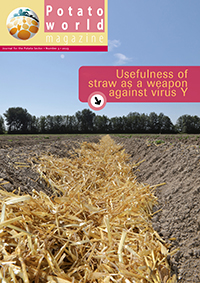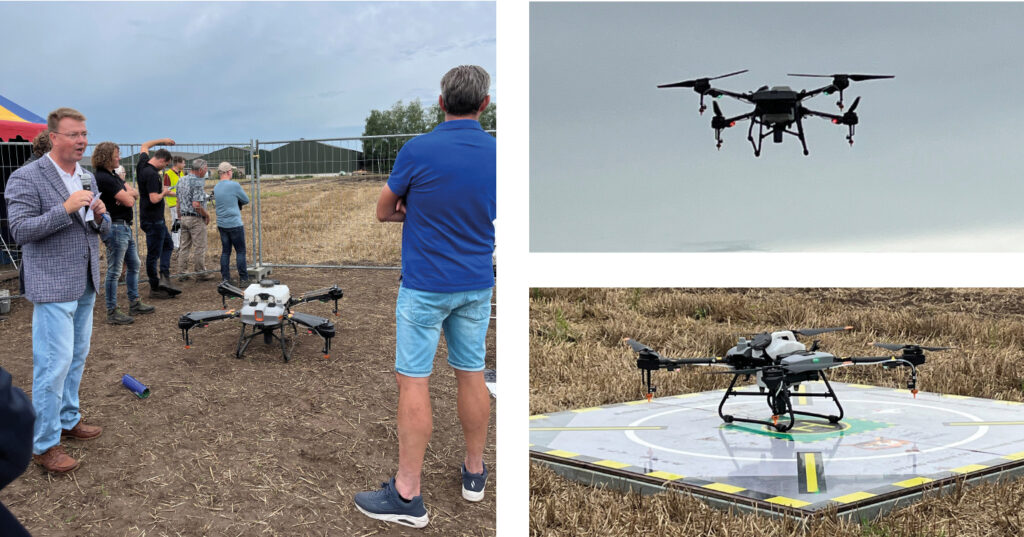Already a subscriber? Activate your premium account

Potatoworld Magazine

Precision agriculture (PA) is a farming management concept based on observing, measuring and responding to inter and intra-field variability in potatoes and other crops. Any technology that helps making pesticide use more sustainable is welcome. A closer look at spray drone applications demonstrated this summer in The Netherlands.
European and national agricultural policies ask for serious reduction in pesticide use in current years. Weather conditions in 2023 caused such high late blight disease pressure in potato crops in NW Europe that growers had to apply intensive fungicide spray schemes in order to safeguard the produce. Consequently, we can already predict that the 2030 50% reduction target on pesticide use of the EU Farm to Fork strategy will not already be met in 2023 by arable farming in this region. Could spray drones be an extra tool in sustainable crop protection and contribute to meeting pesticide reduction targets?
Drones are not new. They have been used in agriculture since the early 2000s, but it wasn’t until the 2010s that the technology became widespread enough for farmers to employ it. Expectation of drones in agriculture were high those years. Drone service providers first focussed on mapping spatial variation of crops and weeds with camera and data processing, with the aim to sell these maps as a basis for variable rate (VR) of spot spray task maps for fertilizers and pesticides. Unfortunately, this product market combination did not get wide adoption in NW European agriculture. Costs of the services were in general higher than the savings on inputs on the fields. Strict safety regulations for flying drones are a major part of the costs involved. Some successes in niche markets were reached, such as VR or spot applications of pesticides based on mapping of blossom density in orchards or specific weeds in crops. And breeding companies and research institutes use drone images for monitoring test plots.

Could a combination of mapping and spraying of pesticides in one flight be an option to make drones more successful in arable farming? Startups investigate the potential of drone sprayers in NW Europe. During the Precision Days exhibition 24 to 26 August 2023 in Reusel, The Netherlands, three types of spray drone systems were demonstrated under an exemption from relevant authority. Especially the drone system that could do spot spraying with drift reducing nozzles showed highest potential to reduce pesticide use and side effects. Current legislation in The Netherlands and other EU countries does not allow pesticide application from airplanes, and drones are classified as airplanes. Amendment of national crop protection laws and drone flight safety regulation have to be considered to allow for drone spraying and acquire the potential positive effect on pesticide use. Discussion are started in e.g. The Netherlands. Spray drones are mentioned in the SUR of the EU.
The devil is also in the detail; do not expect too much from this tool. Drone spraying will only give high reduction in pesticide use for specific pesticides. In case of late blight control, no curative fungicides are available. Spot spraying will not work here; only biomass dependent VR. In other pest cases, drone spot spraying against e.g. specific weeds or patches of Colorado beetle is a way to reduce pesticide use in potatoes and other crops. So, reduction potential of technologies cannot be seen apart from type of pesticide and type of pest. A recently initiated EU EUPAF workgroup is now working on this classification of precision applications for use in pesticide admissions. Fortunately, there are more options for spray drones, such as bringing beneficial organisms/biologicals into crops and do seeding of cover crops.
Dr. Ir. Corné Kempenaar
Wageningen University & Research, and Aeres University of Applied Sciences
Events
©2015 - 2024 Potatoworld | Webdesign and realisation COMMPRO